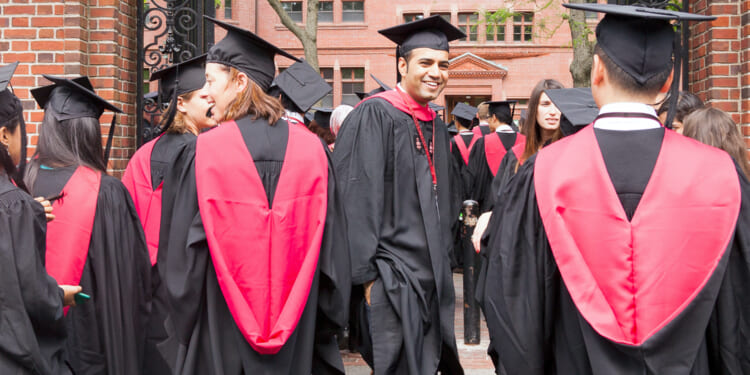The recent reactions by students of arguably the nation’s most prominent university to a report about grade inflation read like they came from the pages of The Babylon Bee, a satirical website. That they came instead from the Harvard Crimson speaks to the crises plaguing higher education.
The melodramatic wailing by Harvard students regarding the school’s grading policies does more than represent a parody of Ivy League education and woke “snowflakes.” It reinforces that taxpayers are propping up a sclerotic, dysfunctional educational system that has problems extending far beyond rampant antisemitism and radical leftist politics.
Everyone Above Average?
Unfortunately, the Harvard report that drew such harsh student condemnation remains hidden on the university’s intranet, but a Crimson article gives the gist. The study “found that more than 60 percent of grades awarded to Harvard undergraduates are A’s, compared to only a quarter of grades two decades ago. It concluded that Harvard’s current grading system is ‘damaging the academic culture of the College.’”
Cue the outrage from students, as documented in a separate Crimson story. One said the faculty’s desire to ensure consistently high academic standards undermined her struggles, saying:
The whole entire day, I was crying. … I skipped classes on Monday, and I was just sobbing in bed because I felt like I try so hard in my classes, and my grades aren’t even the best. … It just felt soul-crushing.
A glib commenter might point out that skipping an entire day’s worth of classes due to the report’s release appears slightly inconsistent with “try[ing] so hard” academically.
But from a more substantive and sympathetic viewpoint, these types of comments demonstrate the mental health challenges facing our nation’s youth. Another student made comments in a similar vein: “I killed myself all throughout high school to try and get into this school. I was looking forward to being fulfilled by my studies now, rather than being killed by them.”
Both sets of comments imply students’ belief that effort will necessarily equal results — that everyone who puts in X number of hours will automatically get A’s. But the world does not work that way, and neither should Harvard. That these students truly believe in this type of “bargain,” and react so harshly when someone questions it, speaks to how our culture has coddled many students into expecting that excellence will come easily, leaving them emotionally unprepared for any setbacks that arise.
Students wanting to be “fulfilled by my studies” seem not to understand the purpose of higher education. Most notably, the act of learning itself — of absorbing and applying knowledge — should serve as its own source of fulfillment and enjoyment, notwithstanding society’s bottom-line focus on grades.
Skewed Priorities
Another student made a similar complaint, telling the Crimson, “What makes a Harvard student a Harvard student is their engagement in extracurriculars. … Now we have to throw all that away and pursue just academics. I believe that attacks the very notion of what Harvard is.”
At the risk of sounding like Ronald Reagan circa 1980, as a federal taxpayer, I am paying for the education of students like this, even if this particular student doesn’t receive federal student aid. And I have zero interest in subsidizing such students to the tune of tens of thousands of dollars per year just to see them spend most of their time playing Quidditch or joining Students for Justice in Palestine.
The Kids Aren’t Alright
The grade inflation report also showed the pernicious effects of social media, whereby Harvard faculty in the humanities and social sciences reported “that they’ve had to trim some readings and drop others entirely, that they’ve had to switch from novels to short stories, and that it’s difficult to keep assigning reading in the face of increasing student complaints.”
In other words, social media is leading to the dumbing-down of college curricula, such that a generation of students who grew up incessantly scrolling through TikTok videos can’t read more than a few pages of text at a time. If the Chinese Communist Party’s links to the app aren’t enough justification to take it off of Americans’ cell phones, the report from Harvard provides yet another reason.
Keep Standards High
More broadly, the Harvard report illustrates the need to reinforce a culture of excellence. That culture would promote striving for achievement to an objectively high standard, recognizing that not everyone will reach that standard, but that all who make an earnest attempt to do so will gain the satisfaction and sense of accomplishment that comes from having done so. The student seeking to be “fulfilled by my studies” should realize that the true sense of fulfillment should come not from “achievement” as a matter of right but from the act of having improved oneself in an attempt to achieve excellence, irrespective of whether one can fully attain it.
Some years ago, while serving as an adjunct faculty member, I had a student’s parents come up to me on commencement weekend. The student’s mother told me, “She didn’t talk about all of her professors, but she talked about you because you challenged her.” It is perhaps the highest form of praise a teacher could ask for, and recalling it still brings tears to my eyes.
I believed then and still believe now that individuals can most excel when asked to do so, and that a university should embody that call to greatness. For Harvard, or any institution, to do otherwise represents a gross dereliction of duty, not to mention a waste of taxpayer funds. Harvard’s willingness to engage in the introspection necessary to reevaluate its role represents a ray of hope — but it also speaks to how far higher education must go to rediscover its purpose in society.

















